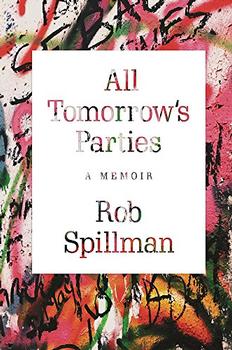Summary | Excerpt | Reviews | Beyond the Book | Readalikes | Genres & Themes | Author Bio

Critics' Opinion:
Readers' Opinion:
First Published:
Apr 2016, 400 pages
Paperback:
Feb 2017, 352 pages
 Book Reviewed by:
Book Reviewed by:
Lisa Butts
Buy This Book
"Was gibt's?" I ask, and our guide snorts. He explains, in German, which I quickly translate for Elissa, that we are in an old ball-bearing factory. He tells me this as he dances across long, sagging boards stretched between cinder-block islands. Our flashlight beams ricochet off the oily water, which has a ferrous, noxious reek, and I picture my foot dissolving in it as if it were sulfuric acid. A faint, far-off beat—a fast, steady thump, thump, thump—matches the pulse in my ears.
"Is there another room to the factory?" I call after our guide, repeating the question in English for Elissa.
"No, no," he replies. "The party isn't in here. This is only the passageway."
Before I can begin to think about where we are heading, on the other side of the waterlogged basement a six-foot-wide hole opens into a dank tunnel. The thump, thump, thump of music is now clear. And up ahead a bright light pulls me forward.
"Entschuldigung, excuse me," my new friend says, shining his flashlight over my shoulder. I turn around and Elissa catches up to us. She gives me her "What have you gotten me into?" look and I give her my "You agreed to this" look back. I also silently give her what I hope is reassurance, and I think she's on the same page, but I really don't care because we're obviously on the cusp of something weird and quite possibly wonderful.
"Where are we?" I once more ask our guide, who snorts again and moves aside so that we can be the first to step through the hole and into a cavernous space constructed of gray granite blocks, the vaulted ceiling sweeping up a good hundred feet. People are dancing everywhere—on piles of paving stones and railroad ties, and in the long trench that runs through the center of the giant space. They are dancing to the loud, steady, bassheavy electronic music, something that sounds like Kraftwerk crossed with Donna Summer. The dancers cast huge shadows from the low, icy-white strobe lights ringing the room. Atop a Lincoln-Log-like construction of scavenged railroad ties perch two sets of turntables and two young men with black-bubble headphones who are bobbing along to the music.
"Where are we?" I shout.
"Under the Wall," our guide yells. "This is an old subway station, from before the war, closed off for forty years. Now we break through and have a rave."
"I never want to leave," I say—out loud, I think. I can't believe this. We are literally between countries, under two countries. I close my eyes and let the concussive bass vibrate through my body. I can feel the beat of my heart aligning with the beat of the music. I'm dissolving, breaking into a million particles. I am nowhere. I am home.
2
"The world is teeming. Anything can happen."
MY FIRST CLEAR MEMORY is of my father being booed. This happened when I was four, twenty-one years before the rave but only four miles away, in the newly opened Mies van der Rohe– designed Neue Nationalgalerie, where my father performed in an avant-garde contemporary music series. Swallowed up in a deep, plush red seat, I was surrounded by West Berlin's cognoscenti, many of whom were booing my father, who was onstage coaxing discordant, grinding sounds from a big black piano.
The lid of the concert grand was open and my father was leaning inside, pulling on the strings. There were bolts and pins jammed in between and around the strings to alter the sound. My dad was wearing black pants, a black turtleneck, and a black beret, and was smoking a cigarette, which I found funny because he never smoked. Nor, for that matter, did he ever wear a beret or black sweater. He never went in for affectations, even in the fall of 1969 when all of the other artists in our orbit had outward-flaring bell-bottoms and bright paisleys, ascots, and heeled boots. West Berlin at that moment was a creative Mecca, or more accurately, an artistic oasis, a multicultural playground situated two hundred miles inside of East Bloc territory, ringed in by a double-rowed concrete wall punctuated by guard towers with machine-gun turrets, outside of which were several hundred thousand heavily armed East German and Soviet troops. The Wall had gone up on August 13, 1961, only three years and five months before I was born. The postwar treaty stipulated that West Berlin was not formally part of the Federal Republic of Germany, which meant that if you were a citizen of the city, you were exempt from compulsory military service. Because of this, young artistic Germans, along with foreign artists and musicians, flocked to this safe haven at the very heart of the Cold War.
Excerpted from All Tomorrow's Parties by Rob Spillman. Copyright © 2016 by Rob Spillman. Excerpted by permission of Grove Press. All rights reserved. No part of this excerpt may be reproduced or reprinted without permission in writing from the publisher.





The House on Biscayne Bay
by Chanel Cleeton
As death stalks a gothic mansion in Miami, the lives of two women intertwine as the past and present collide.

The Flower Sisters
by Michelle Collins Anderson
From the new Fannie Flagg of the Ozarks, a richly-woven story of family, forgiveness, and reinvention.

The Funeral Cryer by Wenyan Lu
Debut novelist Wenyan Lu brings us this witty yet profound story about one woman's midlife reawakening in contemporary rural China.
Your guide toexceptional books
BookBrowse seeks out and recommends the best in contemporary fiction and nonfiction—books that not only engage and entertain but also deepen our understanding of ourselves and the world around us.